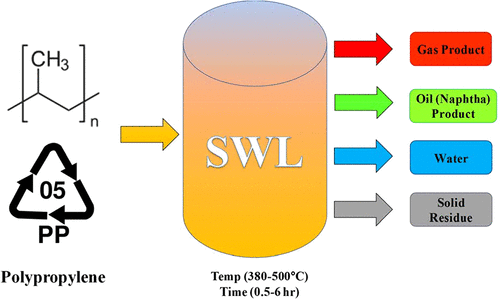当前位置:
X-MOL 学术
›
ACS Sustain. Chem. Eng.
›
论文详情
Our official English website, www.x-mol.net, welcomes your
feedback! (Note: you will need to create a separate account there.)
Use of Supercritical Water for the Liquefaction of Polypropylene into Oil
ACS Sustainable Chemistry & Engineering ( IF 7.1 ) Pub Date : 2019-01-10 00:00:00 , DOI: 10.1021/acssuschemeng.8b03841 Wan-Ting Chen 1 , Kai Jin 1 , Nien-Hwa Linda Wang 1
ACS Sustainable Chemistry & Engineering ( IF 7.1 ) Pub Date : 2019-01-10 00:00:00 , DOI: 10.1021/acssuschemeng.8b03841 Wan-Ting Chen 1 , Kai Jin 1 , Nien-Hwa Linda Wang 1
Affiliation

|
About five billion tons of plastic waste have accumulated in landfills and the natural environment over the past 50 years. Polypropylene (PP) waste accounts for about 23% of the total plastic waste. Converting PP waste into useful products can reduce the accumulated waste and associated risks to the environment and human health. In this study, model PP was converted into oil using supercritical water at 380–500 °C and 23 MPa over a reaction time of 0.5–6 h. Up to 91 wt % of model PP was converted into oil at 425 °C with a 2–4 h reaction time or at 450 °C with a 0.5–1 h reaction time. Higher reaction temperatures (>450 °C) or longer reaction times (>4 h) led to more gas products. The oil products consisted of olefins, paraffins, cyclics, and aromatics. About 80–90 wt % of the oil components had the same boiling point range as naphtha (25–200 °C) and heating values of 48–49 MJ/kg. Reaction pathways for converting model PP into oil under the tested conditions were proposed. Preliminary analyses indicate that this conversion process is net-energy positive and potentially has a higher energy efficiency and lower greenhouse gas emissions than incineration and mechanical recycling. The oil derived from PP has the potential to be used as gasoline blendstocks or feedstocks for other chemicals.
中文翻译:

使用超临界水将聚丙烯液化成油
在过去的50年中,大约有50亿吨的塑料废物堆积在垃圾填埋场和自然环境中。聚丙烯(PP)废物约占塑料废物总量的23%。将PP废物转化为有用的产品可以减少累积的废物以及对环境和人类健康的相关风险。在这项研究中,使用超临界水在380–500°C和23 MPa的条件下,在0.5–6小时的反应时间内,将PP型转化为油。在425°C的条件下,以2–4 h的反应时间或在450°C的条件下,以0.5–1 h的反应时间,高达91 wt%的模型PP转化为油。更高的反应温度(> 450°C)或更长的反应时间(> 4 h)导致更多的气体产物。石油产品由烯烃,链烷烃,环状物和芳烃组成。大约80–90 wt%的油成分具有与石脑油相同的沸点范围(25–200°C),并且发热量为48–49 MJ / kg。提出了在测试条件下将模型PP转化为油的反应途径。初步分析表明,这种转化过程具有正能量,与焚化和机械回收相比,具有更高的能源效率和更低的温室气体排放量。源自PP的油有潜力用作汽油混合物原料或其他化学品的原料。初步分析表明,这种转化过程具有正能量,与焚化和机械回收相比,具有更高的能源效率和更低的温室气体排放量。源自PP的油有潜力用作汽油混合物原料或其他化学品的原料。初步分析表明,这种转化过程具有正能量,与焚化和机械回收相比,具有更高的能源效率和更低的温室气体排放量。源自PP的油有潜力用作汽油混合物原料或其他化学品的原料。
更新日期:2019-01-10
中文翻译:

使用超临界水将聚丙烯液化成油
在过去的50年中,大约有50亿吨的塑料废物堆积在垃圾填埋场和自然环境中。聚丙烯(PP)废物约占塑料废物总量的23%。将PP废物转化为有用的产品可以减少累积的废物以及对环境和人类健康的相关风险。在这项研究中,使用超临界水在380–500°C和23 MPa的条件下,在0.5–6小时的反应时间内,将PP型转化为油。在425°C的条件下,以2–4 h的反应时间或在450°C的条件下,以0.5–1 h的反应时间,高达91 wt%的模型PP转化为油。更高的反应温度(> 450°C)或更长的反应时间(> 4 h)导致更多的气体产物。石油产品由烯烃,链烷烃,环状物和芳烃组成。大约80–90 wt%的油成分具有与石脑油相同的沸点范围(25–200°C),并且发热量为48–49 MJ / kg。提出了在测试条件下将模型PP转化为油的反应途径。初步分析表明,这种转化过程具有正能量,与焚化和机械回收相比,具有更高的能源效率和更低的温室气体排放量。源自PP的油有潜力用作汽油混合物原料或其他化学品的原料。初步分析表明,这种转化过程具有正能量,与焚化和机械回收相比,具有更高的能源效率和更低的温室气体排放量。源自PP的油有潜力用作汽油混合物原料或其他化学品的原料。初步分析表明,这种转化过程具有正能量,与焚化和机械回收相比,具有更高的能源效率和更低的温室气体排放量。源自PP的油有潜力用作汽油混合物原料或其他化学品的原料。











































 京公网安备 11010802027423号
京公网安备 11010802027423号